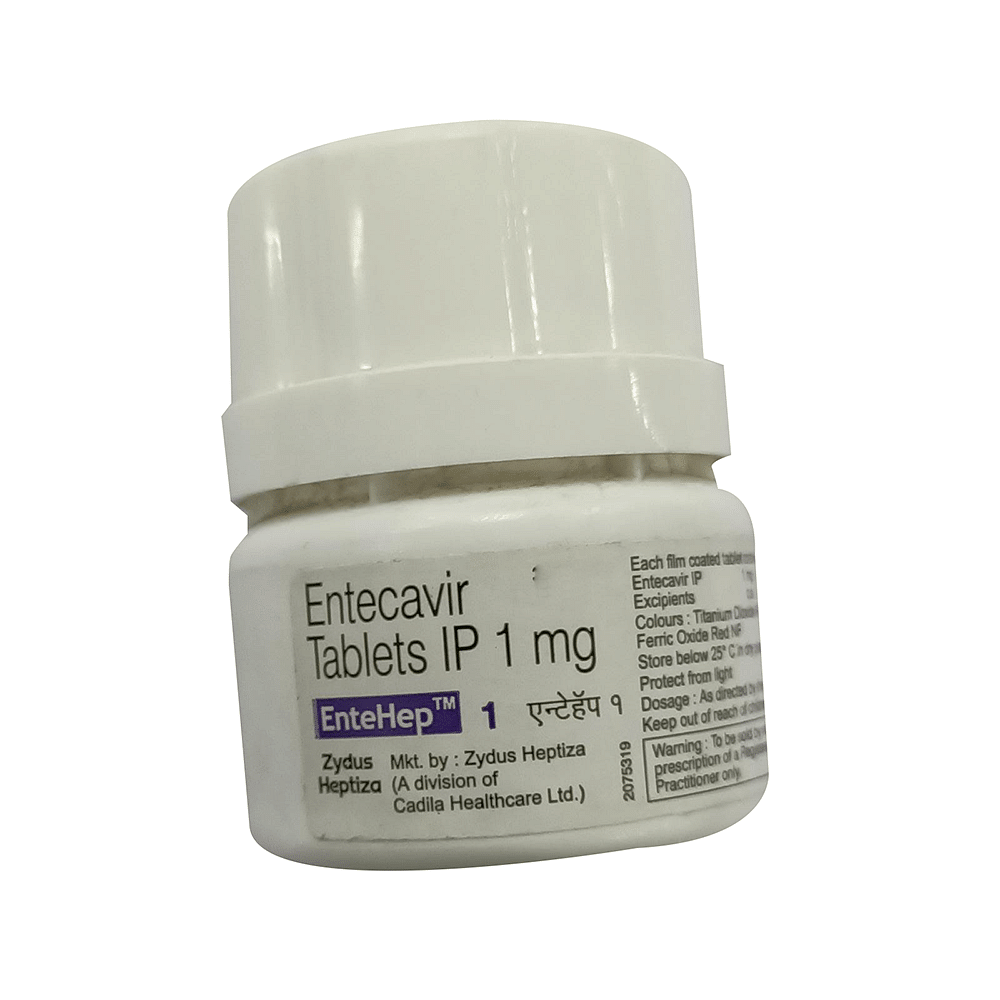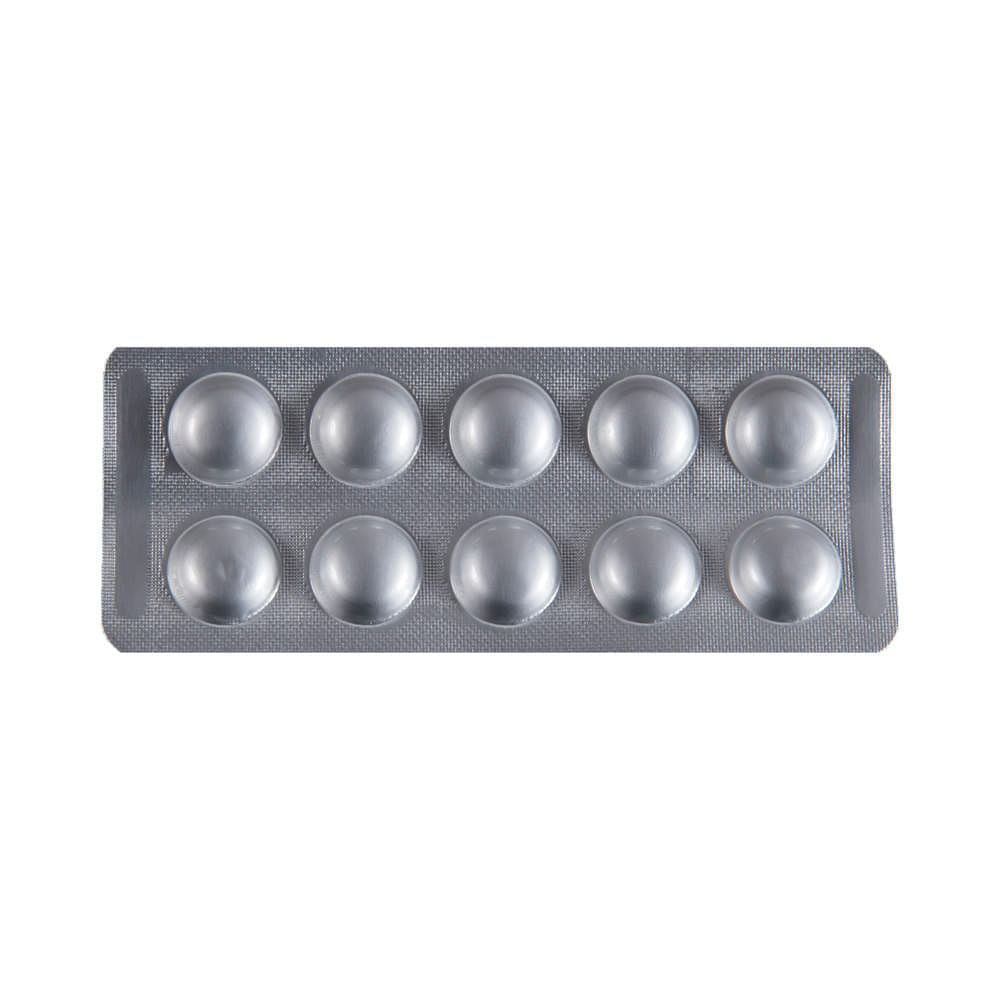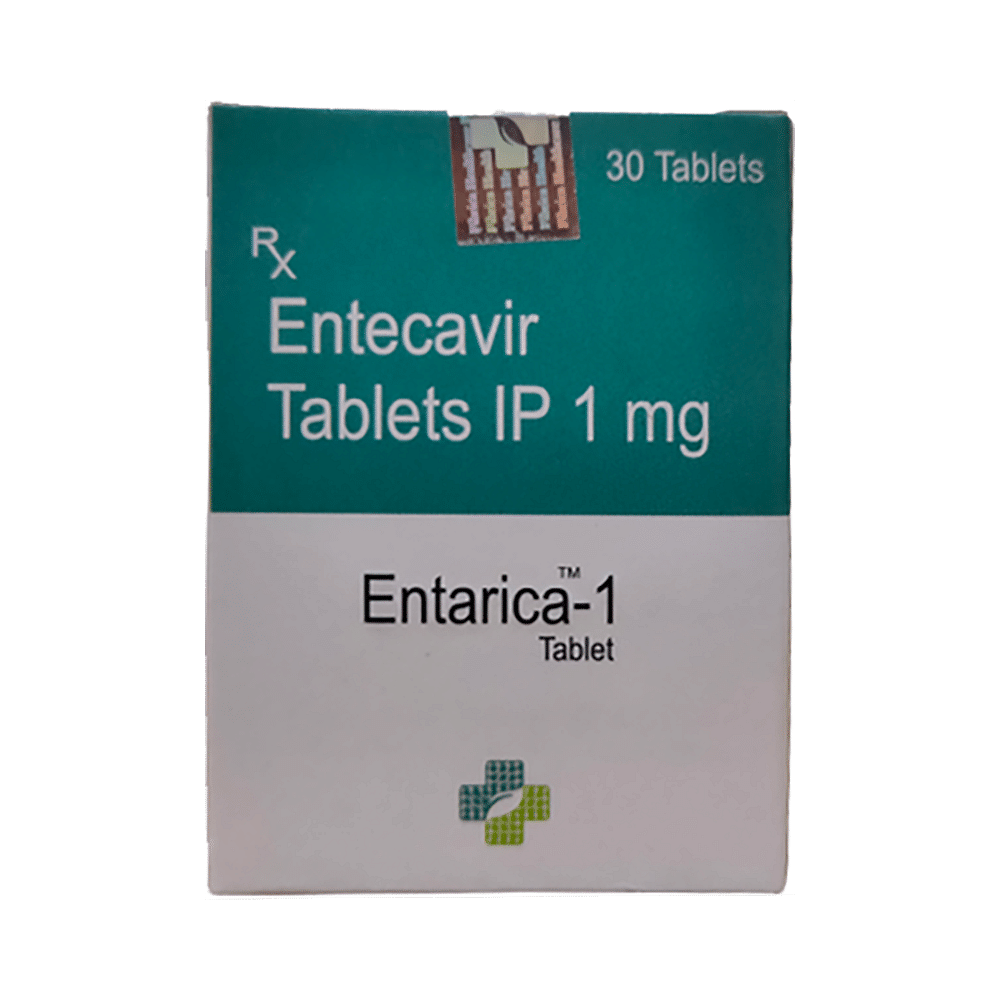


Entehep 1 Tablet
Manufacturer
Zydus Cadila
Salt Composition
Entecavir (1mg)
Key Information
Short Description
Entecavir is an antiviral medicine used in the treatment of hepatitis B virus (HBV) infection.
Dosage Form
Tablet
Introduction
Entehep 1 Tablet should be taken in an empty stomach. Take it in the exact dose and duration prescribed by your doctor. Follow the instructions carefully. Taking it regularly at the right times greatly increases the effectiveness and help improve liver function and decrease the risk of complications associated with chronic HBV infection. It is not known whether Entehep 1 Tablet will reduce your chances of getting liver cancer or liver damage (cirrhosis) which may be caused by chronic HBV infection. Do not miss a dose and keep taking until your doctor tells you it is safe to stop. Common side effects of this medicine include headache, nausea, vomiting, stomach pain, fatigue, and diarrhea. These are usually not serious but tell your doctor if they bother you or do not go away. Rarely, some people may experience a skin reaction or liver damage. Your doctor will closely monitor you for these in the initial period of treatment.
Directions for Use
Take this medicine in the dose and duration as advised by your doctor. Swallow it as a whole. Do not chew, crush or break it. Entehep 1 Tablet is to be taken empty stomach.
How it works
Entehep 1 Tablet is an antiviral medication. It prevents the multiplication of virus in human cells. This stops the virus from producing new viruses and clears up your infection.
Quick Tips
You have been prescribed Entehep 1 Tablet for the treatment of chronic hepatitis B virus (HBV) infection. Take it on an empty stomach at least 2 hours after or before a meal. Do not drive or do anything requiring concentration until you know how it affects you. You may still develop infections or other illnesses associated with viral infection while taking this medication. During treatment and for at least six months after stopping this medicine regular blood tests are needed to monitor your liver function level of hepatitis B virus and blood cells in your blood.
Related Medicines

Entavir 1mg Tablet

Entarica 1 Tablet

X Vir 1mg Tablet

Entarica 1mg Tablet

Baraclude 1mg Tablet

Entihep 1mg Tablet
Frequently asked questions
How should Entehep 1 Tablet be taken?
Take Entehep 1 Tablet exactly as prescribed by your doctor and continue taking it until you are told to stop. It is usually taken once a day on an empty stomach, at least 2 hours after a meal and at least 2 hours before the next meal. It's recommended to take it around the same time each day. If unsure, consult your doctor.
Can Entehep 1 Tablet cause liver problems?
Yes, Entehep 1 Tablet can potentially cause serious liver problems like hepatomegaly (enlarged liver) and steatosis (increased fat build-up in the liver). It is important to be aware that these conditions are a medical emergency requiring immediate attention.
What are the symptoms of serious liver problems?
Symptoms of liver problems may include jaundice (yellowing of skin or whites of eyes), dark-colored urine, light-colored stools, loss of appetite, nausea, and stomach pain. These symptoms are more common in women, overweight patients, or those taking Entehep 1 Tablet for a long time. If experiencing any of these symptoms, contact your doctor immediately.
What is drug resistance? Can I develop drug resistance with Entehep 1 Tablet?
Drug resistance occurs when the medicine once effective against an infection becomes ineffective. This typically happens due to a virus or bacteria acquiring changes within the body, impacting the medicine's effectiveness. This can lead to reduced response to the medication and decreased efficacy.
How long should I take Entehep 1 Tablet?
Do not stop taking Entehep 1 Tablet without consulting your doctor. Stopping Entehep 1 Tablet before treatment may worsen your hepatitis B. It is crucial to adhere to the prescribed dosage and avoid missing any doses.
What if HIV infection co-exists with HBV infection? Will this affect treatment with Entehep 1 Tablet?
The use of Entehep 1 Tablet is not recommended in individuals with both HBV and HIV infection without appropriate management of the HIV infection. Starting Entehep 1 Tablet before addressing HIV may lead to drug resistance for prescribed HIV medications. Therefore, it's crucial to perform HIV tests on patients diagnosed with HBV before initiating treatment with Entehep 1 Tablet.
Can Entehep 1 Tablet cure hepatitis B?
No, Entehep 1 Tablet does not cure hepatitis B but may improve the liver's condition. The medicine can help decrease the amount of hepatitis B virus (HBV) in the body by limiting HBV’s ability to replicate and infect new liver cells.


